#a perfect tableau of homosexuality
Photo
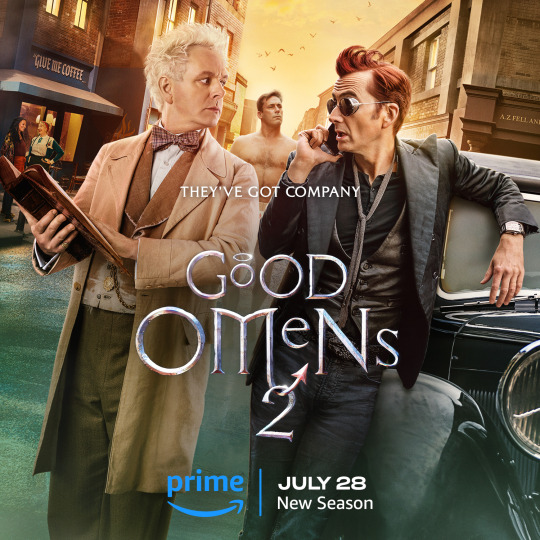
This is by far the gayest thing I have ever seen...
#good omens 2#aziraphale#crowley#gabriel#michael sheen#welsh seduction machine#david tennant#soft scottish hipster gigolo#jon hamm#ineffable husbands#i'm screaming#a perfect tableau of homosexuality#overwhelmed with The Gay#i can't#so much happening here#the chaotic queer energy of this picture though#you love to see it#can't wait to watch#amazing
345 notes
·
View notes
Text
Outlander: Of Lost Things (3x04)
Another of my absolutely favorite scenes from the books was featured in this episode, and I loved it a lot. I do have a few qualms, though...
Cons:
For the first time, I felt like the 20th century plot couldn't keep up with the 18th century story. Basically, we see Claire, Roger, and Bree continue to hunt for signs of Jamie. But eventually, Claire comes to the conclusion that she can't keep searching for a ghost. She decides it's time to go home to Boston, where she has her home and medical practice waiting for her. There wasn't really enough going on to justify an episode's worth of materials, and consequently these scenes almost felt like they were discarded bits left over from last year's finale, as we've finally caught up with the events we left off with last season.
And then there's the Brianna problem. Sophie Skelton is... not doing a great job. Her line delivery is stilted to the extent that she comes across like somebody performing in a high school play. Her dialogue is maybe a little bit hokey too, as she talks about hope and love and never giving up... but the thing is, the other actors on this show have been able to pull off lines like that, and she can't. The only thing that gives me hope for her character is that her best moments are the ones with Roger. As we move forward, the majority of her scenes will be with him, and not with Claire, so maybe their chemistry will develop into something more enjoyable to watch. For now, I'm disappointed that Bree, an excellent character from the books, is translating so poorly to the small screen.
My last complaint is with the pacing, which I think might be a constant worry this season. Voyager is a big book and a lot of stuff happens. The stuff at Helwater, which for the most part I absolutely adored, went by so fast that we missed a lot of the nuance. The Lord John stuff was excellent, but there should have been more of it. And there should have been more ambiguity in the Geneva pregnancy situation. There were a number of shortcuts, the most annoying of which was Hal's intrusion into the story. Apparently he got drunk and spilled the beans to Geneva about Jamie's true identity, which is what allowed her to blackmail him into coming to her bed. Hal comes across like a drunken idiot, which is so contrary to his character from the books. I don't imagine Hal will play much of a role in the series, as he's a relatively minor character who is probably easy to cut out for the most part. But still - John's brother is pretty awesome and I felt like we got a bit of character assassination with him in this episode.
Pros:
Despite the pacing being a problem, the stuff at Helwater was still pretty great. Geneva is a notorious figure from the books, widely reviled, as she coerces Jamie to have sex with her and then gets pregnant with his child. We can all love Willie and still hate on Geneva, right? The show made her similarly bratty and unbearable, but there was a certain level of care in the sex scene between her and Jamie. I might have liked it if that scene hadn't gone on quite as long, but... the moment where Geneva tells Jamie that she doesn't know what to do, and asks him to show her... that moment connected the scene with Jamie and Claire's first night together. The situations were quite different, but in one key way they were not: Jamie and Claire did not know each other all that well the first time they had sex, and Claire taught Jamie how it was to be done, as he'd never done it before. And now Jamie is giving the gift of a gentle first time to a young woman who is about to be married off to an old man against her will. Say what you will about Geneva, and I'll say an awful lot, but the way she was handled in the show made me sympathize with her quite a bit.
Isobel Dunsany was a delightful surprise. I don't remember exactly how she was described in the book, as it's been a while since I read it, but this portrayal of her felt right on. She's timid and a little awkward, clearly overshadowed by her abrasive and stunning sister and the memory of her deceased brother. But she's kind and she sees things more clearly than one would suppose. She knows that Geneva's child is Jamie's, and not Geneva's late husband's, and yet she keeps the secret. After Geneva's death in childbirth, Isobel strikes Jamie in fury, but later actually apologizes to him. Due to their differing statuses, Isobel could have easily been cruel to Jamie and he would have been powerless to stand up for himself. She also dotes on Willie, even knowing his true parentage, and promises Jamie to look after his son. Isobel kind of rules and I wish we could see more of her.
The real meat of this plot thread, for me, is the stuff with Lord John. (Surprise, surprise. Expect me to gobble up every morsel of this man the same way I did for Fergus last season). Lord John is such a good person and I'm just so crazy about him. I'm glad we got to see at least one chess game, although of course I would have preferred a whole series of them like in the book. But to watch these two men, with the weight of such a history between them, able to crawl their way to a friendship is just... it's so fun. It's more interesting than a lot of Jamie's friendships. Of course he loves his sister and Ian. Of course he loves Murtagh and the other members of his clan. Those are friendships built on blood and culture. With John, it's... against all odds. The best scene in the episode is when John reveals to Jamie that he knows William is his son. The two go for a walk, and Jamie asks John for a favor - will he look after Willie, and act as a father to him? If he does, Jamie would be willing to... well, let John have his way. John is slightly horrified by the offer, and Jamie says "do you not want me, then?" John replies, quite matter of fact: "I shall probably want you until the day I die," but of course he won't take Jamie up on that offer. In fact, John has his own news - he is to be married to Isobel. He cares for her, and this way he will be able to look after Willie. Jamie is grateful, and says that John shall always have his friendship, if that means anything to him. John says it means a great deal.
Okay. Just... yes. This scene is everything to me. It's sort of a useless conversation to contemplate sexual mores of this time period. Of course John being homosexual would have been seen as a horrific, criminal thing to his peers of the time period. And the fact that Jamie knows this key thing about him means that Jamie has power over John in a very dangerous way. But Jamie trusts him - even likes him - anyway. In the books, Jamie actually gives John a chaste kiss on the lips to seal the promise to look after Willie. While that is an iconic and excellent moment from the book, I really like the way they played it out here as well. Back in Ardsmuir, John's come-on to Jamie took the shape of putting his hand over Jamie's, and then stroking his finger. The clasping of hands took on an intimate tone that Jamie found unacceptable. Now, all this time later, Jamie puts out his hand for John to shake, and when John takes it, Jamie puts his other hand up over John's, in a parallel of John's action back in the prison. Such a subtle thing. Such a moment of acceptance and trust between these two very different people. Without giving too much away about future events, let's just say that these two don't always have the smoothest sailing relationship, but their abiding bond remains, and it's one of the best things in the whole series.
Before I wrap up, I should also mention Willie, Jamie's illegitimate son. I'm going to ignore the fact that the little boy playing Willie doesn't much resemble Sam Heughan, because... come on. I'm sure they'll cast a ginger to play older Willie when the time comes. This kid was adorable, and even though they didn't have much time together, this episode managed to solidify Jamie and Willie's bond quite nicely. Jamie says earlier that he's lost "two children," referring to Faith and Brianna, and if you think about it, he's also lost a foster son in Fergus. So watching him play with his child, chastise him for being spoiled, secretly baptize him as a "stinking papist," and even give him a carved wooden snake like his own brother, also named Willie, had done for him... all of this stuff was adorable and heartbreaking. Poor Jamie is deprived of the chance of raising any of his children.
The ending sequence of this episode, played under a Bob Dylan song, hit the right note exactly. You see Claire and Brianna back on a plane to Boston, Claire having given up on her hunt for Jamie through the pages of history. This is cut with clips of Jamie leaving Helwater to return to Scotland, a freedom granted him because of his actions in saving the infant Willie from Geneva's deranged widower. As he leaves, we see Lord John and Lady Isobel standing in tableau with their de facto son Willie. John stares wistfully after Jamie. Willie actually runs after him, and John and Isobel chase after him to hold him back. Jamie rides slowly away from his son, unsure if he'll ever see him again. Touching and perfect and so freakin' sad.
I'll leave it there. Based on episode titles, I'm fairly certain that the big reunion is going to be episode 6, meaning we have one more episode to catch Jamie up to the print shop, and get Claire back into the proper century. As impatient as I am, I also wonder how the rest of this season is going to go, pacing-wise. Thus far, I've been really happy with the material I've gotten, and my only big complaint has been wishing for more.
8/10
1 note
·
View note
Text
WEEK 5, ENTRY 2 of 2: Surrealism, reconsidered.
In terms of a surrealist “canon,” a continuum of texts in that tradition that make the kind of interventions that surrealism does (juxtapose reality and unreality, draw attention to the things we casually accept through that juxtaposition, use strategic discomfort to narrative ends, etc...), I began to consider what a good “counter-text” would be for a movie like Belle du Jour... a visual piece that a. traffics in the surreal image, b. considers, in a Foucaultian way, the Transgression of the Limit as an act of self-definition, a becoming.
For the demarcation I wanted to draw between text and counter-text, I could not shake Belle du Jour’s obsession with sexual violence, its exploitativeness, and its gross, squicky implication that “nono.. its cool.. she really WANTED to be violated.” This demarcation led me to my PERFECT counter-text, a surreal watch that does surreal better than the surrealists themselves (I feel COMPLETELY comfortable asserting that. Fight. Me.). I give you, Bryan Fuller’s Hannibal on NBC, 2013-2015.
Hannibal is based on the prequel novel to Silence of the Lambs, entitled Red Dragon. Interestingly, Red Dragon features an primary antagonist serial killer who sexually exploits his victims (the man Hannibal Lecter is to help Will Graham catch), but in adapting this killer to the big screen, Bryan Fuller refused outright to focus on the sexually assaultive aspect. In explanation, he said: “There are frequent examples of exploiting rape as low-hanging fruit to have a canvas of upset for the audience. The reason the rape well is so frequently used is because it’s a horrible thing that is real and that it happens. But because it’s so overexploited, it becomes callous. That’s something I can’t derive entertainment from as an audience member,” and also, “ I find that it’s not necessarily thought-through in the more common crime procedurals. You’re reduced to using shorthand, and I don’t think there can be a shorthand for that violation — it’s an incredibly personal and intimate betrayal of something that should be so positive and healthy. And it’s frequently so thinly explored because you don’t have the real estate in 42 minutes to dig deep into what it is to be a victim of rape.” (Slay, Bryan, you are KING amongst showrunners.)
Underlying his explanation of why it is distasteful to him to exploit assault on the screen is his appraisal that doing so is unnecessary -- assault is not the only, or even the best, or even a good, way to create a “canvas of upset” for the audience -- so what we get with Hannibal is a show about violation in a different way than sexual exploitation of the female body (and holy crap does it showcase violations), without being a vehicle for impressing the audience into the most predatory of audience gazes for a cheap point.
Now, Hannibal as “surreal.” And boy, is it surreal. The juxtaposition of reality and unreality is on FULL display.
SPOILER ALERT, NBC HANNIBAL.
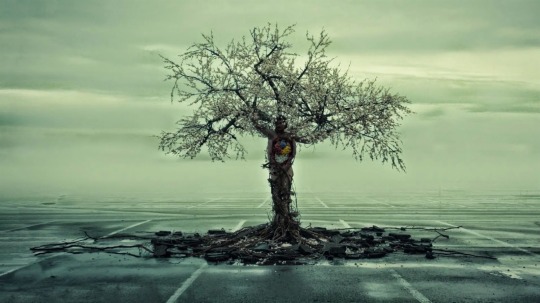
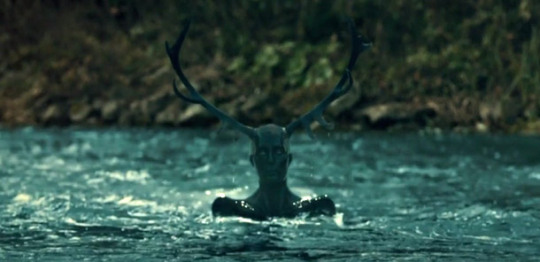
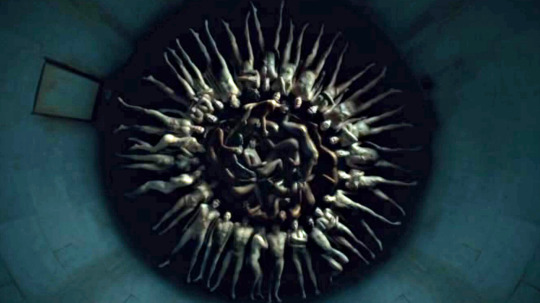
Our main character, Hugh Dancy’s Will Graham, inhabits the positionality of Catherine Deneuve’s in du Jour -- it is he who will transgress limits to “become himself.” If Deneuve in her role explored becoming a sexually expressive woman in a sexually repressive space / culture (though, arguably, presented in the film as becoming a sexually expressive woman in no less exploited of a form), Will Graham’s becomings are two, double, and intertwined -- one is becoming the exact sort of psychopath that he is so good at mentally inhabiting in order to help his employers at the FBI catch them, and one is becoming one who can homosexually commune with one who is like him, with another person who has underwent that first becoming, a becoming-monster. The first becoming is what introduces a lot of the surreal imagery, some pictured above. Graham’s mindscape is inhabited by the specters of those he has killed, or other serial killers who he has empathized with, and it is also inhabited by strange forms, feathered stags, and a collossal man with onyx black skin and giant stag antlers, who periodically raises out of rivers or appears in mirrors or ... in one scene... curls up on the ground while Will claws his way out of his pregnant body. (The reality/unreality dichtomy is on full display, however, with the crime scenes, which are not Graham’s imaginings, but “real events” of the show -- see the “tree” and “eye” tableaus above). The dreams of Belle du Jour that surrealistly show Deneuve, outside of temporal logic, dealing with the symbolic dream-content of her becoming, are present in Hannibal in this way, in Graham’s fever dreams. In fact, they both have a tree-tying vision, as it turns out.
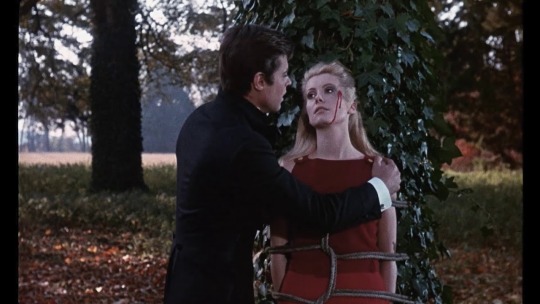
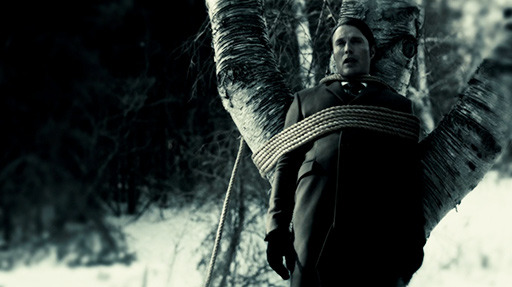
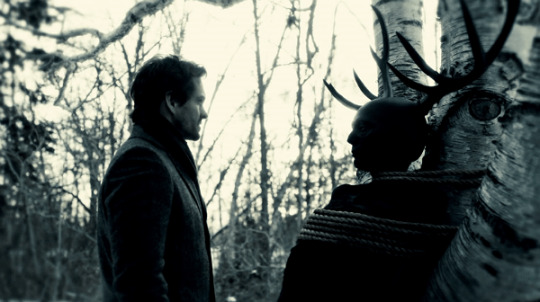
It is this second becoming, the one toward homosexual (or really, pansexual) communion, that is for many the most interesting aspect of the show. Hannibal is a very, very, very gay show, and in a very fascinating way, that has a surrealism of its own, even aside from the visual surrealism. This has to do with the fourth-wall breaking conversation that this show began to have with its audience as the show progressed. Right here on tumblr, a robust community of individuals began to ship (short for relation-ship, or to pair romantically) “Hannigram” and to write mountains of fan fiction of varying levels of explicitivity about them fucking, killing together, both at the same time, etc. Well, the strange occurance that happened is, the show began to enter into active conversation with the Hannigram shippers. It was to the point where the tweeters and tumblrs would coin “Murder Husbands,” and it would appear in the next episode.
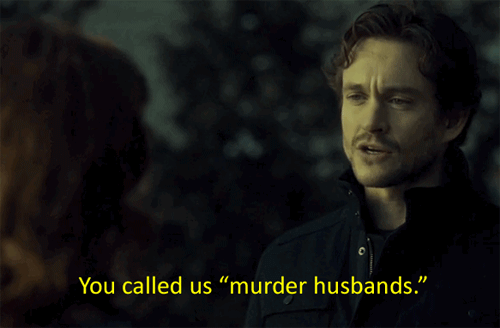
This is a very different kind of relationship between reality and unreality, one that arguably would not have been possible in the days of film development and cinema-release debuts.... rather than portraying a relationship between reality and unreality, Hannibal embodies it, conversing with the audience-in-the-Real’s sexual experience of the characters. Will Graham’s becoming-gay is the audience’s becoming-shippers. For a show with only two sex scenes in it, and only one of which with easily distinguishable bodies, I don’t know that I have ever seen a show with more tension of desire written on the faces of the characters, the presentation of which is part of the show’s relationship with its audience. In a word: the camera’s Gaze is aware of Queer Desire. And somehow, the transgression of a norm, a limit, represented by an audience coming to love a MAJOR NETWORK lead-character pairing in a very, very, gay way and have that investment paid off in real-time seems more transgressive than a bougie lady hob-knobbing in brothels with women who have to do it to even eat, Belle du Jour, but maybe that is just me. Speaking of, in terms of the figure of the Woman on this show, there is a lot going on with very complicated characters such as du Maurier, Chiyo, and Reba as important recurring characters and many others who stop in for an episode, but a very important pairing and Becoming that the show showcases is the relationship between Margot Verger and Alana Bloom.
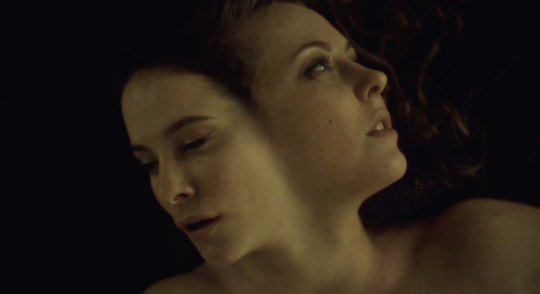
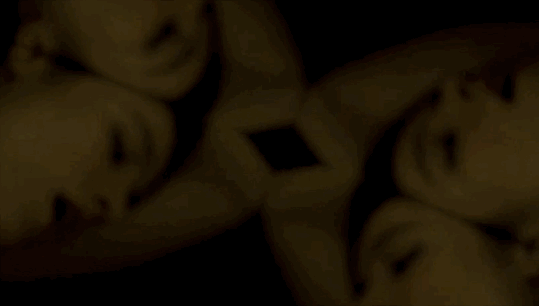
The show got criticism in Season 1 for seemingly trying to push romantic relationships between Bloom’s FBI psychiatrist and both Will and Hannibal, but it was actually Bloom’s actress Caroline Dhavernas and Verger’s, Catherine Isabella, who asked the showrunner Bryan Fuller if they could do a sex scene together. It was in that way that we get one of the most powerful (and surreal) depictions of communion I have ever seen on a screen -- the kaliedoscopic blurring in and out of the two women’s bodies, so that it is not until a minute into the scene that it is even clear whose bodies we are seeing. Margot, an exceedingly wealthy heiress of a pork empire who is exploited brutally by her brother, first-in-line heir apparent, and Bloom, who over the course of the show suffers deeply by her involvement with the Murder Husbands, have a sort of becoming-woman-together in which they become a queered family that is isolated from the self destruction of the serial killers and safe from the controlling hand of Mason Verger. In short... Hannibal contains as a damned side story (that is still longer than du Jour’s runtime) a very comparable becoming to Catherine Denuvue’s in Belle du Jour, only less problematic and arguably more visually impressive.
But back to the film’s surreal imagery, and what that might have to say about the body, and about audience’s relationship to text...
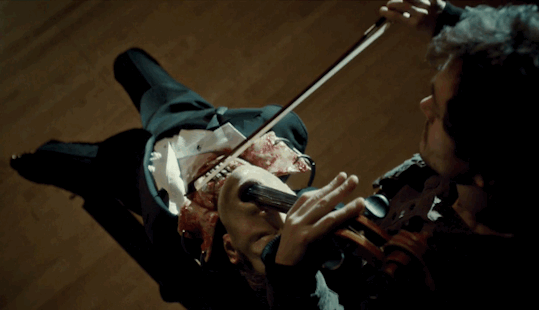
Hannibal has a lot to say about gaze.
In the very first episode, Will Graham kills a serial killer in a police shooting whose last word to him sticks in his head throughout the entire show... “See?” Indeed, Will’s “power”, in the sense that the lead cop in crime procedurals always seems to have some almost extra-sensory kind of power, is to “see” -- the FBI leads Graham to a typically impressive and elaborate murder-tableau crime-scene, and Will “sees” the intention or “design” of the killer almost as if it were his own memory. In this sense, Will is like an art critic -- he “sees” the art, and he “reads” it as a text, “seeing” a phenoumenal world behind the text. Of course, this is exactly what we as audience do as we watch film. If in La Ley del Deseo, Almodovar played with the typical Male Gaze by comparing it to the manipulative and murderous character of Banderas, here, Fuller compares all of us binge-watchers watching violent TV on Netflix in 10 episode chunks to serial killers daydreaming about bloodscapes. Same thing that Fuller, a vegan, does with Hannibal Lecter’s beautiful food presentation by comparing the presentation of human meat to animal meat. Fuller’s Hannibal “sees” with a camera that certainly is a desiring Male Gaze, but a Gaze that contains an implicit critique of the way that that cinematic gaze works... female bodies are present, and fabulous, but not exploited; males and females both are murdered and their bodies transformed, but their bodies are not sexualized; violence is shown, but to critique the way that we see violence, instead of to participate in the traffic of such imagery without self awareness. In many ways, the particular Male Gaze shown on Hannibal is the “sick” Male Gaze, the gaze of the psychopath who would mass murder...
...only to turn that Gaze on us, and say: hey, look how comfortable you are “Putting On” that Gaze, isn’t that the Gaze of most action / horror film?
“See?”
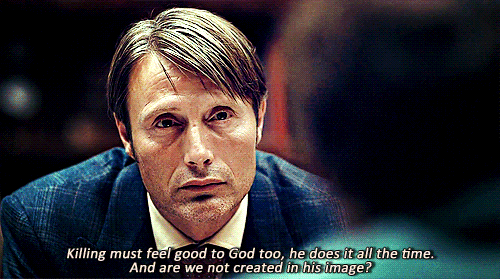
Hannibal uses the cinematic gaze as a mirror to force us to look at the cinematic gaze, and as such, as its critique of our gaze’s “sickness” has me wondering what another kind of Gaze would look like.
0 notes
Note
DT sitting like a chaotic beautiful bisexual bottom in that new staged photo with Michael, complete with rainbow socks. Also can we take a moment to admire what a fine figure of a man Michael is in that same photo! He's deliciously THIC and so sexy.
God, absolutely 100% yes to everything you've said here, Anon. There is so much I love about that picture and it merits further analysis, so what the heck, let's go for it:
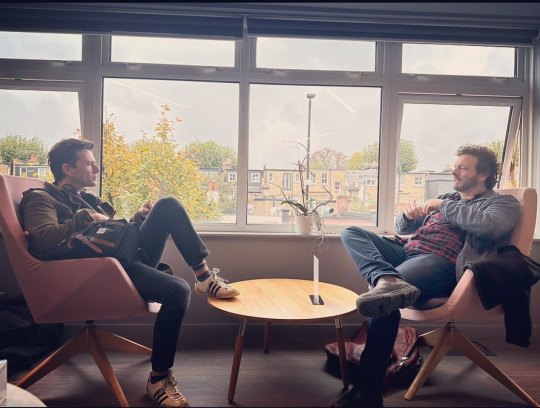
First of all, I truly do not think I have ever seen anyone sit the way David is sitting--one foot up on the table? Half-slouching in the chair?--and the rainbow socks are just the cherry on top of the Scottish bisexual sundae.
One of the things I absolutely love about this picture is the energy radiating off both of them in it. David is giving bottom energy, and Michael is giving top energy, and that juxtaposition just makes it even more obvious how beautifully they complement each other. But it's the body language that also gets me--how completely comfortable and open Michael and David are with each other. They look so relaxed here, so at ease with one another, and with Michael in particular it's such a stark contrast to how stiff and closed off he tends to look with AL. Here, both his and David's guards are down--physically and emotionally--and it's truly lovely to see.
And yes, I would be remiss if I didn't echo your sentiments about Michael's figure here. What I said above about that juxtaposition (in my opinion) extends to David's long, graceful legs and Michael's strong thighs/lap. It's like you look back and forth between them and see two pieces that just fit--in every way two people can fit together. One goes with the other, and as gorgeous as Michael and David are separately (which they most definitely are), they both somehow become even more attractive when they are together. As if they bring out the best in each other on the inside, and it shows on the outside.
Delicious. I can only hope we might be in store for some more BTS pics of David and Michael from Georgia (additional configurations of that David/Michael pile up in the conference room, perhaps?). Fingers crossed...
#anonymous#reply post#michael sheen#welsh seduction machine#david tennant#soft scottish hipster gigolo#staged 3#or 'brokeback mount him' which is what i am referring to staged as from here on out#behind the scenes#a perfect tableau of homosexuality#or bisexuality in this case#he's so bi he can't even sit straight#lap made for straddling#and david's long legs are made for straddling laps#good times#ineffable lovers#discourse
29 notes
·
View notes